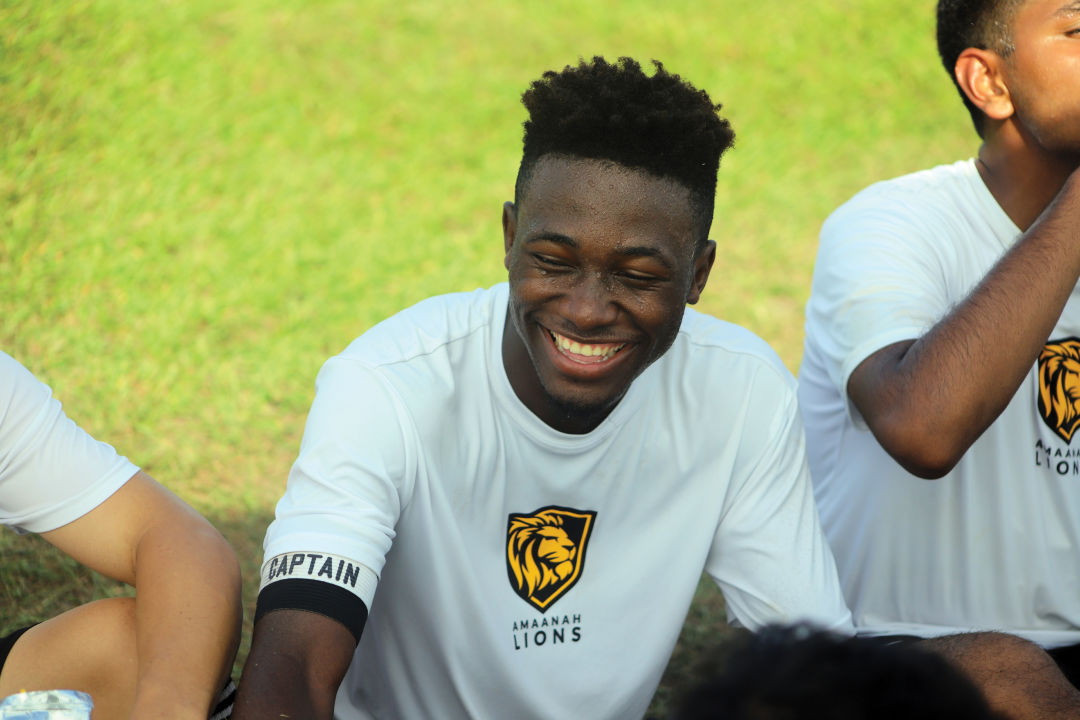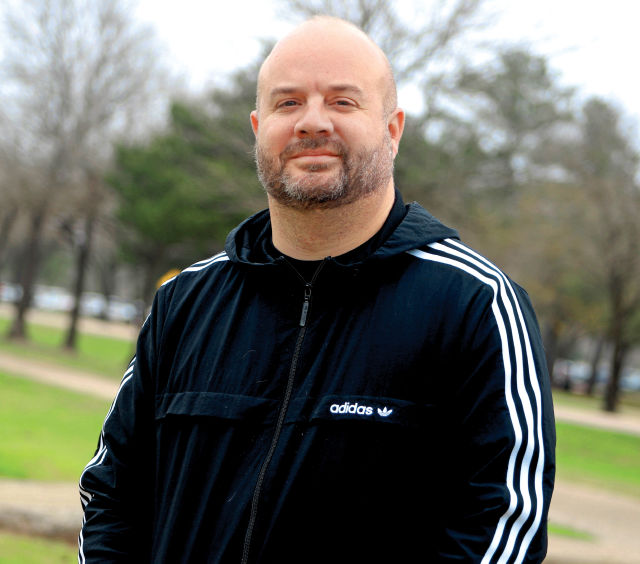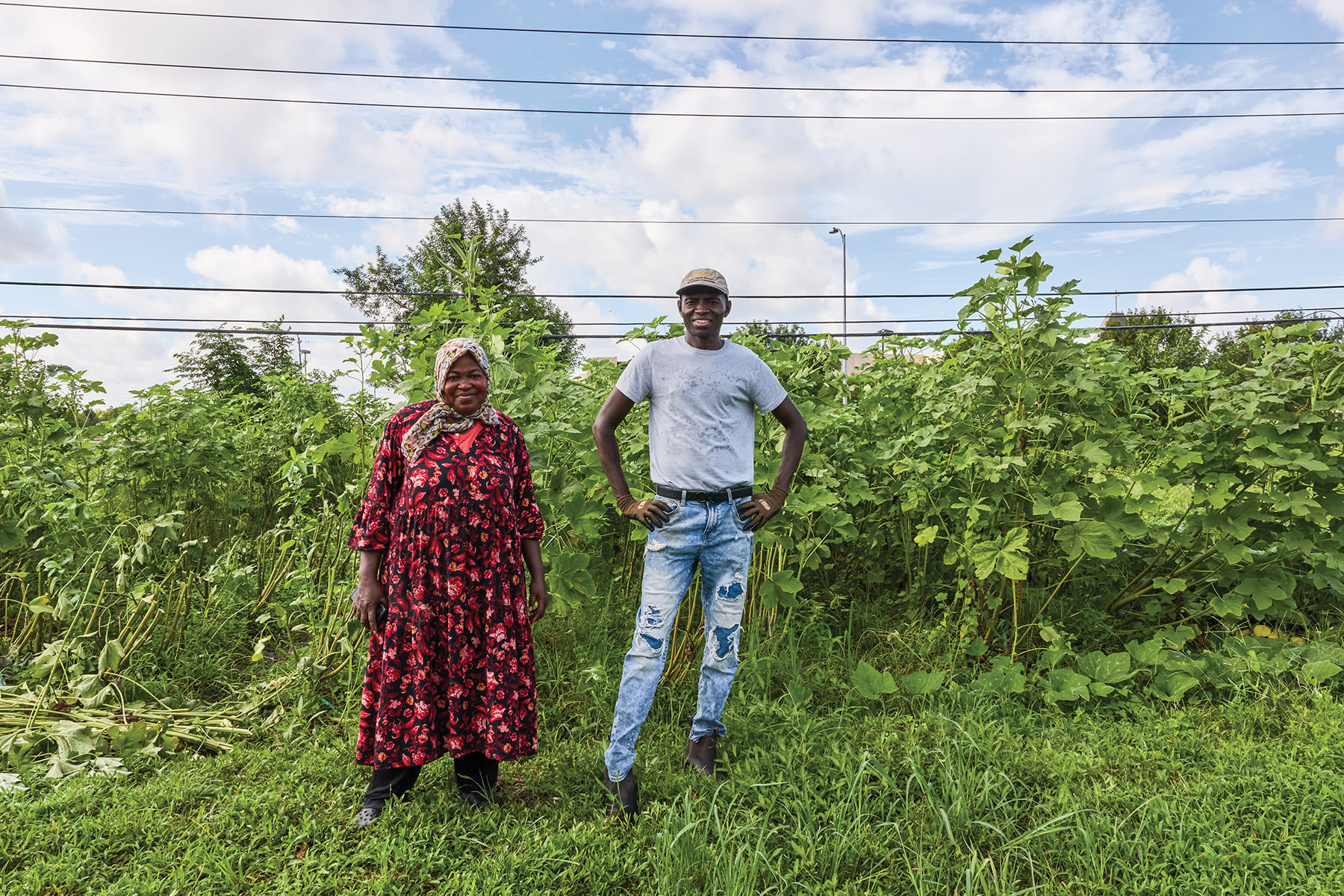For Many, Playing for the Amaanah Lions Is a Game Changer

Mluli Mmunga with teammates.
Image: Courtesy of Amaanah Lions
There were just five minutes left on the clock. The Amaanah Lions were up 2-1 against the Revelation FC, the only team that had ever beaten them. This game was the culmination of months of hard work, and for the 21-year-old forward and team captain, Mluli Mmunga, it meant more.
During the previous season the Lions had been invincible, winning 14 games, tying two, and securing the division championship—a feat for any competitive team, but the Lions are also the Houston Football Association’s first competitive team composed solely of refugees from nations around the world. Their triumph had put them in a more difficult division this season, though, and their first (and so far only) loss, back in November 2019, had been a major blow.
However, under Mmunga’s encouragement, over the five months since then the Lions had been practicing harder and longer so that when they faced the Revelation again in February 2020, they would be ready. With the second half drawing to a close, Yoshan Bhujel, a Nepalese immigrant, had broken the tie, but just winning wasn’t enough. The Lions wanted a decisive victory.
Mmunga drew back his foot while the other Lions sprinted down the field, moving into position. They were all kids from somewhere else, many of whom were still struggling to understand the new culture they found themselves in, but all of that fell away as Mmunga’s boot met the ball.
For Mmunga, that moment is the essence of what it means to be one of the Lions. While most suburban American kids fall in love with soccer during orange-slice-and-Gatorade-fueled games on glossy green fields, Mmunga’s passion blossomed out of a tumultuous childhood in Tanzania. Born to Congolese refugee parents, Mmunga was just 6 when his father died after years of battling illness. His mother followed shortly after. Mmunga went to live with his grandmother, uncle, and three cousins (who had also lost their parents). His grandmother rose every day at dawn to work on a farm to support them all, sometimes not returning home until midnight. “She’s the bone of the family,” says Mmunga. “Everything, honestly, that we achieve is all because she made it happen. She gave us the chance.”
In 2009 the office of the United Nations High Commissioner for Refugees helped the family move to Houston. They settled in the Chimney Rock area, but Mmunga, who spoke no English at all, struggled to adjust. Entering Las Américas Newcomer Middle School for sixth grade, he says, “I would have to use my hands to try to explain and show what I wanted. It was difficult. New country, new culture, new language, new everything.”
He began learning English in the school’s ESL program, but quickly discovered a means of connecting outside of the classroom: soccer. The game was transformative for Mmunga and his cousins. “It opened up doors for us,” he says. “We got the opportunity to learn and hang around with other people our age, even though we didn’t know the language.”
First came pickup matches with cousins and neighbors every Saturday in a park near his house. After two years in Las Américas, Mmunga had enough of a grip on English that the school transferred him to Jane Long Academy, a public 6–12 school in Sharpstown, for eighth grade. In his first year at Jane Long, he made the soccer team as a forward. Playing soccer was how he found his American identity.
He played throughout high school, and when he got to Prairie View A&M in fall 2018 he immediately joined the club team. Unfortunately the financial aid wasn’t sufficient, he says, and Mmunga returned to his family’s home at the end of the first semester. Deflated, and feeling lost without a team to be part of, he finally decided to take a friend up on an open invitation to join the Amaanah Lions for practice.
The team was formed in 2013 by the local organization Amaanah Refugee Services, which helps refugee families and kids navigate life in Houston through an array of services (it’s donated $55,000 in coronavirus relief in the form of hot meals, grocery cards, and financial services in 2020) and programs, including tutoring, counseling, and women’s empowerment classes—and the Lions. The Lions have helped nearly 200 young adults, ages 16 to 25, integrate into their new American lives in Houston while also building an unbreakable support network between them.
Mmunga immediately found himself among friends: There was Aman, whom Mmunga calls “the dad of the team.” And Arnold, also from Tanzania, now like a little brother, always cracking jokes in their native Swahili. And trusty Mya from Nepal, who once drove 30 minutes to help when Mmunga’s car broke down. All had gone through the same challenges. “They had to tackle obstacles that I did as well, so I had a bigger connection from that,” Mmunga says. He had people to talk to who understood the disconnect of being dropped into the Bayou City from another world. He felt at home.

Richard Spragg, manager of Amaanah Lions
Image: Courtesy of Amaanah Lions
“That’s what sports do. They bond people very quickly,” says Richard Spragg, the team’s manager. “Suddenly you’ve got friends. You’ve got something that you have to do, and it’s something you know how to do. Suddenly the task of becoming part of this country doesn’t seem so enormous.”
Spragg, a Brit who’s co-managed the Lions since 2015, has watched these players progress both on the field—the team only became competitive in the HFA league in 2018 after years of operating as a casual weekend program—and off. But Mmunga’s dedication impressed Spragg, leading him to name Mmunga team captain for the 2019–20 season. “Whether it’s scalding hot or in the winter when it is freezing cold and it’s wet and it’s dark, you know Mluli is always going to be at practice,” Spragg says. “His commitment and his energy has been infectious.”
Being captain has meant setting up drills and helping guide the team through warm-ups, yes, but also being given the opportunity to act as a role model for his teammates. There are 25 players on the Lions of varying skill sets, and as he’s been leading them this year, Mmunga has been hyper-aware that they’re all paying attention to his actions. “I’ve made sure that everything I’ve done, on the field and off the field, is captain material,” Mmunga says. “Always set a good example for others to follow.”
The Lions have a new captain each season, so when Mmunga returns he will no longer hold the position, but his time in the role has already helped him figure out that next to soccer, he loves teaching best. He’s now saving up money to go back to school and study education, hoping one day to become an educator—and maybe to coach a school’s soccer team.
After scoring that final, late-stage goal last February, winning the match 3-1, the whole team clustered together, screaming and jumping up and down. The Lions were ready to take the rest of 2020 by storm, until the coronavirus arrived—the league had completed about 80 percent of the season when the HFA abruptly ended it because of pandemic concerns in March. By then they’d already won 12 of 14 games, though, with one tie and one loss, the best record in their division. The HFA awarded them the 3A Championship. Now the team, which is still waiting for it to be safe to collect their trophy and have a celebration, will compete in the more challenging division next season.
Until then they’re hanging out virtually as much as they can. Teammates recorded a toilet paper challenge video—dribbling rolls of TP like pros in living rooms and bedrooms—and they’re starting to get back onto the field in small groups to practice. “We are always in touch with the players, and the players are always in touch with each other,” says Spragg. “It’s a close-knit team, on and off the field.” A good thing, since there’s more to being a Lion than the game.
“At the end of the day,” says Mmunga, “it’s about family.”




